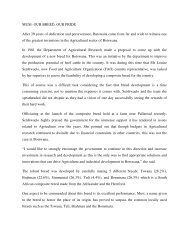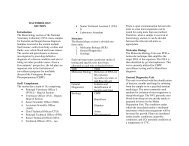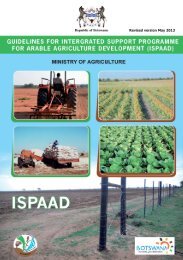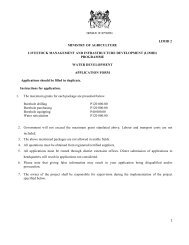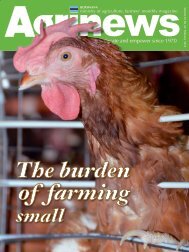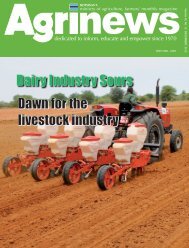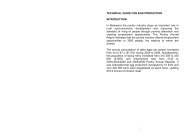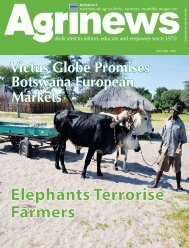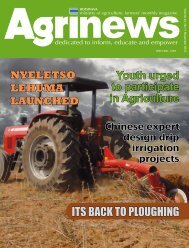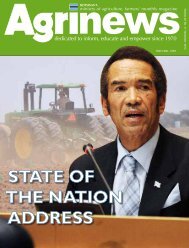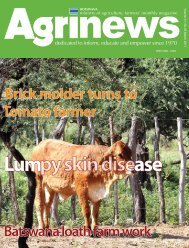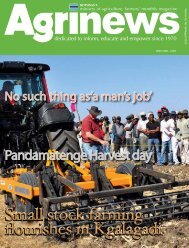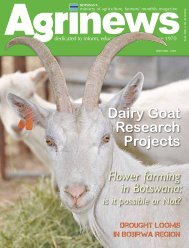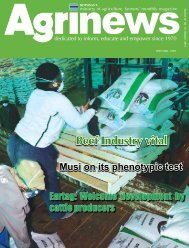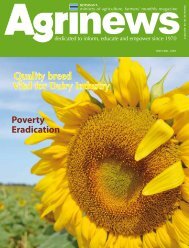GHANZI SHOW - Ministry of Agriculture
GHANZI SHOW - Ministry of Agriculture
GHANZI SHOW - Ministry of Agriculture
You also want an ePaper? Increase the reach of your titles
YUMPU automatically turns print PDFs into web optimized ePapers that Google loves.
Article: Segomotso Basuti<br />
Photos: Aggripah Willie<br />
When I retired, I told myself<br />
that I’m going to look after<br />
my cattle for no one can do<br />
a better job than I can.”<br />
These are the words <strong>of</strong> a passionate<br />
farmer. His eyes light up when he talks<br />
about his cattle and the love he has for<br />
them. Mr Tiyapo Sekgopa, told his wife<br />
upon retiring from the public service in<br />
1994 that he decided to go into cattle<br />
rearing full time. He knew it was not<br />
going to be easy, but also knew that<br />
with passion everything was attainable.<br />
In 1994, Sekgopa tried his luck at<br />
Artificial Insemination (AI). He beams<br />
when he counts the advantages <strong>of</strong> using<br />
AI. Though the government allows one<br />
farmer to bring only five cattle to the<br />
AI Centre during insemination season,<br />
he applauds the service as it gives an<br />
opportunity for all farmers to have their<br />
kraals boasting with good breeds.<br />
Sekgopa says that AI increases the<br />
chances <strong>of</strong> conception, adding that one<br />
has power over the kind <strong>of</strong> breed they<br />
desire to dominate their kraal, as the<br />
farmer is given the choice <strong>of</strong> using the<br />
best bulls to come up with the finest<br />
<strong>of</strong>fsprings. To top it <strong>of</strong>f, he says with the<br />
conception rate increasing, one can be<br />
confident that their cows will increase<br />
each breeding season.<br />
Currently, Sekgopa has 104 herds<br />
<strong>of</strong> cattle, 30 being products <strong>of</strong> AI. He<br />
has not yet decided on which breed to<br />
specialize in but the one that seems to be<br />
winning his heart is the Limousine. He<br />
says the reason behind this is because it<br />
does not take a long time to calf.<br />
A Diamond Driller by pr<strong>of</strong>ession,<br />
Sekgopa says he goes back<br />
to work once in<br />
a while on<br />
contract agreement just to increase the<br />
family income, saying that this is the<br />
only time he engages a herd boy to look<br />
after his cattle.<br />
Sekgopa believes that the strategy he<br />
has set for himself works pretty well.<br />
“As I wanted to run my cattle post as a<br />
business, I had to go an extra mile and<br />
learn what I needed in order to achieve<br />
this.”<br />
Teaming up with his son, they collected<br />
material and studied the diseases that<br />
were prone to their area, at Mogotho wa<br />
Dinotshi cattle post, Kweneng.<br />
“Diseases are not really a problem here,<br />
as we take all precautionary measures to<br />
prevent them, the only thing worrisome<br />
is the wild dogs which are very difficult<br />
to ward <strong>of</strong>f.”<br />
Sekgopa says that he has ensured that<br />
cattle maintain themselves. He works<br />
by an inventory where all the activities<br />
taking place in the farm are captured.<br />
“I have bought a laptop which I use to<br />
register everything, from administering<br />
medicine, updating those that have given<br />
birth, those that have died and even those<br />
I have culled as a result <strong>of</strong> not<br />
doing well.”<br />
H e<br />
f u r t h e r<br />
states that<br />
the inventory<br />
also keeps record<br />
<strong>of</strong> those he takes<br />
to A.I camps and<br />
the successful<br />
and unsuccessful<br />
inseminations that<br />
occurred during<br />
breeding period.<br />
Sekgopa believes one cannot progress<br />
if one does not do a documentation <strong>of</strong><br />
the everyday activities <strong>of</strong> his/her farm.<br />
He believes this is the reason he has<br />
continued to do well over the years.<br />
Any livestock farmer in Botswana with<br />
a valid Brand Certificate and Omang<br />
can benefit from the A.I services. The<br />
Principal Scientific Officer, Animal<br />
Breeding, Aubrey Ranko stated that<br />
each farmer is allowed to bring five (5)<br />
cows per brand to be inseminated in a<br />
breeding season.<br />
Breeding season starts in September<br />
and ends in March in government A.I<br />
camps costing the farmer P50.00 for<br />
the 5 cows to be inseminated with<br />
locally collected semen. Ranko said<br />
though there are problems that they may<br />
encounter during breeding season such<br />
as deaths due to diseases and predators,<br />
Batswana have generally embraced the<br />
artificial insemination service.<br />
“The farmers’ response is very positive<br />
because none <strong>of</strong> Government A.I camps<br />
is underutilized and more farmers with<br />
ranches are now venturing into the On-<br />
Farm A.I programme.”<br />
Ranko explained that the most<br />
preferred breed by farmers is the<br />
Brahman, and this could be<br />
attributed to the Tswana type <strong>of</strong><br />
breed that is dominant amongst<br />
local farmers. He said because <strong>of</strong><br />
this small framed Tswana breed,<br />
little or no complications such as<br />
dystocia are experienced during birth.<br />
July 2012



